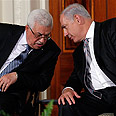
Abbas and Netanyahu in Washington
Photo: AP
Much ink has been spilled on the direct talks between the government of Israel
and the Palestinian Authority and their chances of success.
While the Palestinians reportedly want to begin by discussing permanent borders, Israel insists on focusing on security arrangements and its recognition as a Jewish state.
Ironically, agreement between the sides regarding re-starting direct negotiations for the first time in 18 months seems to have been followed by disagreement over almost everything else, including over which subjects the sides will negotiate.
Peace Talks
Attila Somfalvi
Prime Minister Benjamin Netanyahu leaves for Sharm el-Sheik peace talks but political sources are already assigning blame for talks' possible failure. PA must act responsibly, they say
In fact, while the issues to be discussed are highly significant, what is more noteworthy is the way those issues are grouped together in clusters for the negotiation teams. As the typology of issues predetermines the division of labor among negotiation working groups, and because each group usually performs a ‘give and take' in order to create an internal 'package,' the way in which these negotiation issues are divided has a systemic impact on the deal reached.
The current division of negotiation issues includes borders, security, refugees, Jerusalem, water, and economic arrangements. The 'Jerusalem cluster' covers questions of sovereignty over the Temple Mount and security and municipal cooperation between the sides in the capital. The 'Territory cluster' includes questions over borders, settlements, and Palestinian safe passage between Gaza and the West Bank.
The 'Security cluster' meanwhile includes issues such as the border regime, Israeli use of Palestinian airspace, demilitarization and early warning stations. The 'Economic cluster' negotiates topics such as trade and taxation or damages to the Palestinian state for Israeli occupation. Water rights, or plans for a desalinization plant are included within the 'Water cluster'. Finally, the 'Refugee Cluster' examines legal, civil and declaratory aspects of the Palestinian refugees.
However, this typology of issues is not geared around creating stable state-to-state relations between Israel and the future Palestinian state. In fact it is drawn from the same model as that used by the Lausanne Conciliation Commission following the 1948 War between Israel and the Arab states.
Yet the 1949 Lausanne talks didn't envisage the establishment of a Palestinian state. They were primarily dealing with an Israeli-Arab conflict, not an Israeli-Palestinian one. And unlike today, they had no need to take into account the asymmetry between the two sides.
Therefore, the current typology is structurally irrelevant for today's issues between Israel and the Palestinians.
Balance of interests
A more relevant negotiations agenda typology would be designed around the clusters of those issues that are likely to shape Israel's relations with a future Palestinian state. Such an approach may also make it easier to actually reach and implement a deal.
Rather than borders, security, refugees, Jerusalem, water and economic arrangements, Israel might consider a new division of 'intrusive issues', 'conventional issues', 'personal security issues', and 'historic issues.’
This re-division would change which group discusses each issue. Rather than being divided into different clusters, as per the current division, municipal arrangements in Jerusalem, or maintenance and operation of water sources would be negotiated in the cluster of 'Conventional Issues.' Arrangements on movement and access within Jerusalem or the Holy Basin, or agreements for movement through the entry and exit points between Israel and the Palestinian state would be dealt with in the 'Personal Security Issues' cluster.
Additionally, the question of final borders, refugees, sovereignty over the Temple Mount, and damages for the occupation would all be discussed in one group, that of 'Historic Issues'.
Finally, the question of a safe passage between the West Bank and Israel, or Palestinian access to the Israeli port at Haifa – issues that 'intrude' into Israeli sovereignty, could be discussed together with Israeli requests to 'intrude' into Palestinian sovereignty, namely control over Palestinian airspace or demilitarization.
By regrouping issues in this way, the existing tendency to “close agreements” within each working group can be better leveraged. This, in turn, will help achieve a different systemic outcome. For example, linkage between different issues – such as the Palestinian demand for a safe passage and the Israeli demand for control over Palestinian airspace – can be used to create a balance of interests that may lend itself to greater stability. Alternatively, compromises by one side over Jerusalem or borders may be linked to compromise by the other side over refugees.
Israelis and Palestinians disagree deeply on issues that touch the core of their national-religious-historical identity, and changing the typology of negotiation issues won't suddenly solve them. However, it would make it easier for the negotiating teams to achieve a stable two-state reality that offers both peoples a better future.
The author is an analyst for the National Security Team at The Reut Institute in Tel Aviv, a non-partisan, non-profit strategic policy group. www.reut-institute.org
- Follow Ynetnews on Facebook















